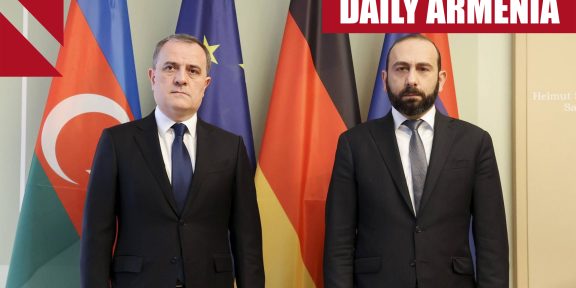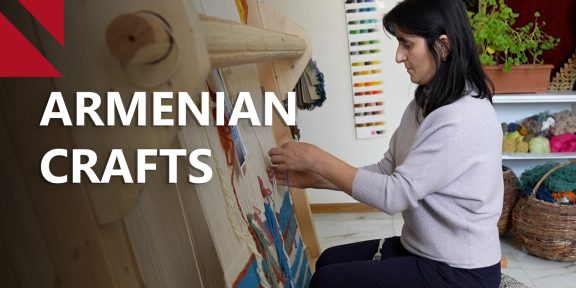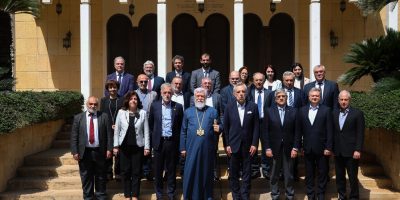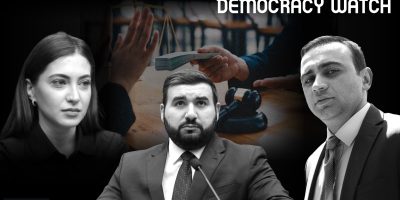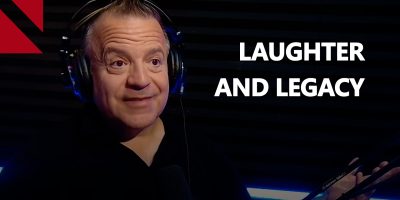Istanbul Armenian Hayko Baghdat is one of Turkey’s best known contemporary writers and columnists, also known for his bold and sharp criticism. In his latest book, “Snail,” Baghdat talks about his childhood, adolescence and military service in the Turkish army. CivilNet’s Aline Ozinian spoke with Hayko Baghdat in Istanbul.
We met Hayko Baghdat at Jash Restaurant, which belongs to another Armenian, Dayk Mirijanian and talked about the difficulties and challenges of being an Armenian in Turkey. Fragments from the Armenian Genocide and Hrant Dink can be found in his recently published book, “Snail.” The book’s title comes from the idiom, “Sell a snail in a Muslim neighbourhood,” which describes the failure to bring innovation to a closed society. Baghdat identifies himself with a snail, and through his simple style and illustrations from life tries to show Turkish readers how the life of an Armenian child born in Turkey starts and is shaped.
Hayko is married and has two sons. He writes for the Taraf daily and supports the activities of the “Friends of Hrant Dink” group. The number of Hayko’s followers on social media networks keeps increasing on daily basis, especially in Turkey. He begins his day wishing a good morning in Armenian — “Pari Luys” — to his followers and teaching other Armenian words to them. Baghdat, contrary to the majority of Armenians living in Turkey, is not one to give up. He is fighting for justice, not only for the Armenians, but also for other ethnic and social groups subjected to persecution and intimidation.
Hayko, is it difficult to be born an Armenian in Turkey?
Before the baby is born, the relatives carry out preparatory work, they prepare your crib, the room, and so on. The most sacred items are put in baby’s room. Muslims put the Koran in their room, the Alawites, a picture of Ali, Christians, the images of Jesus Christ and the Virgin Mary, Marxists, put photos of Karl Marx and Engels. And this is a good thing, it’s for the creation of a better life and a free world.
As the child grows up, he implicitly, without hesitation adopts those sacred sanctuaries. After growing up even more and leaving their home, entering life they make connections in the street, in the neighbourhood, at university; they notice that their sanctuaries are treated badly by everyone. They see that those things that are sacred for them and for others have nothing in common. The crowd does not accept neither Jesus Christ, nor Mary, nor the fact that you call your mother “mayrik” in Armenian. It’s not a good start, not a just start for the child. And the child constantly wonders why is it so bad to be an Armenian in Turkey, and he perceives being an Armenian as a disease.
When, as you mentioned, you feel a difference between your spirituality and theirs, what do you do?
Hayko – There are two choices. One is, metaphorically speaking, to live like a sick man, a disease that ends in death. For these people what matters is to live the rest of their lives with dignity and value, regardless of the number of years. On the contrary, there is another way. Recognizing that life is already a deadly disease, some instead of living a worthy life, prefer to hide their existence, acting like an ostrich, ignoring everything and neglecting, keeping their sanctuaries in secret, concealing what they are.
Probably most of them…
Yes, that is an option. However, there is another way which I realized quickly at a very young age. I wrote about it in my book. The second is to try to improve the situation somewhat, I seem to have chosen this option.
Your name is Hayko, which means you have no redemption. What happens when you say your name?
My mother is of Greek origins, I am a leftist and socialist. This means everything that is the considered the worst and the most hostile from the point of view of Turkey’s official history, is combined in me.
On the other hand, however, people watching from the Armenian Diaspora and Armenia can say you’ve been “Turkified,” you are a lost cause. That is not the case, especially when you live a life where you’re accused of Armenianness in your every step – starting from going out to the street and greeting your friends. It has a simple reason. The Turkish hero is the murderer of me, my hero is the murderer of them. That’s how they wrote their history. That’s why you live a life everyday, where you are in constant tension and struggle.
You have decided not to leave Turkey, to stay and struggle. What is feeding your approach, which is the driving force behind this struggle?
There are two questions. The first is – where will I go? My land, culture, the language I speak is here, my happiness and sadness, my tragedy and emotions are here. I am a son of this land, I haven’t simply come here from elsewhere. People ask, where did the Armenians here come from? We have been here a long time ago, the roots feeding me are here, my roots are below my feet. So, the first reason is, I have nowhere else to go to.
And the second is more like a tragicomedy. The conscience of the human who finds himself in such a tragicomedy seems to be hocked. If in 1915 it was a movie, or, say, a dream where Armenians fled to the desert, the Turks who had that dream would wake up terrified. In their dream, everyone would wish the salvation of mothers who walked the desert holding their children. But what happened a 100 years ago, why did the Turks go to the side of evil and kill people in the deserts? This is what I’m asking Turks. Why did you do that?
What do the they answer?
The responses are, in the end, positive. An awakening is noticed in Turkey after Hrant Dink’s murder. During meetings aimed at confronting the past, there were only 5-6 people present – one was a transsexual, one was a Kurd, one Alawite, one Armenian and the other was a woman adorning a headscarf and was representative of those who, until recently, were facing pressures. They talked about their life experiences, people were saddened by those stories, and thus these meetings were a success. However, confrontation does not mean that you have to constantly and continually tell the victim, the Armenian, about the calamity that befell him. What happened to us, Armenians, is already known. The main question is, what happened to the Turks? What happened that you decided to put aside our shared history, and attempted to find mitigating circumstances, why did you pave the way for this crime?
What I’m saying is not only about Armenians. The foundation of the crime lies within the culture, the killing of 34 people in Roboski can not be considered a new thing. In Turkey, the nation state is the murderer, a state which was built on the basis of crime. Today, not only Armenians are threatened by that state but also the Turks, Kurds, Alawites and all the peoples of Turkey. This is what I’m trying to explain to the people of Turkey.
In Turkey, where you were once a child, now you have children. Are they luckier than you?
There is one very important factor – Hrant Dink’s life and work. After Hrant’s murder, they kept reminding me that I have two children, why do I act this way, am I not afraid? I replied and continue to say, yes, I have two children, that’s why I am doing this. Racism, xenophobia, denial are rolling toward us like a snowball. If it passes me by me, it will reach my child. We must try our utmost to lessen that violence. And the second, well, what can happen more than this? Enough already. And I don’t say this only about the Armenian Genocide. I’m talking about the whole image. Life in Turkey is not like a Hollywood film, it’s not so simple. Our life is more like a French film.
Hayko, you’ve put together your contemplations and experiences in one book and tried to explain it to the reader. And as far as I can see, there were those, who understood.
This book of a leftist Armenian was aimed at a specific mass in Turkey. However, this did not happen. More than 35,000 copies have been sold in two months already. I do not know whether this is a serious number for Armenia or not, but for Turkey this is a large number, it will be included in this year’s best-selling books list.
I visit many places in Anatolia, I have gone to New York, the United Nations, the European Parliament, Brussels. And about half of those who come to listen to me, to get a signed copy of the book are women wearing headscarves, conservative-minded men and women, even nationalists. Thus, this voice was heard in Turkey, and beyond.
You can watch the interview here.






